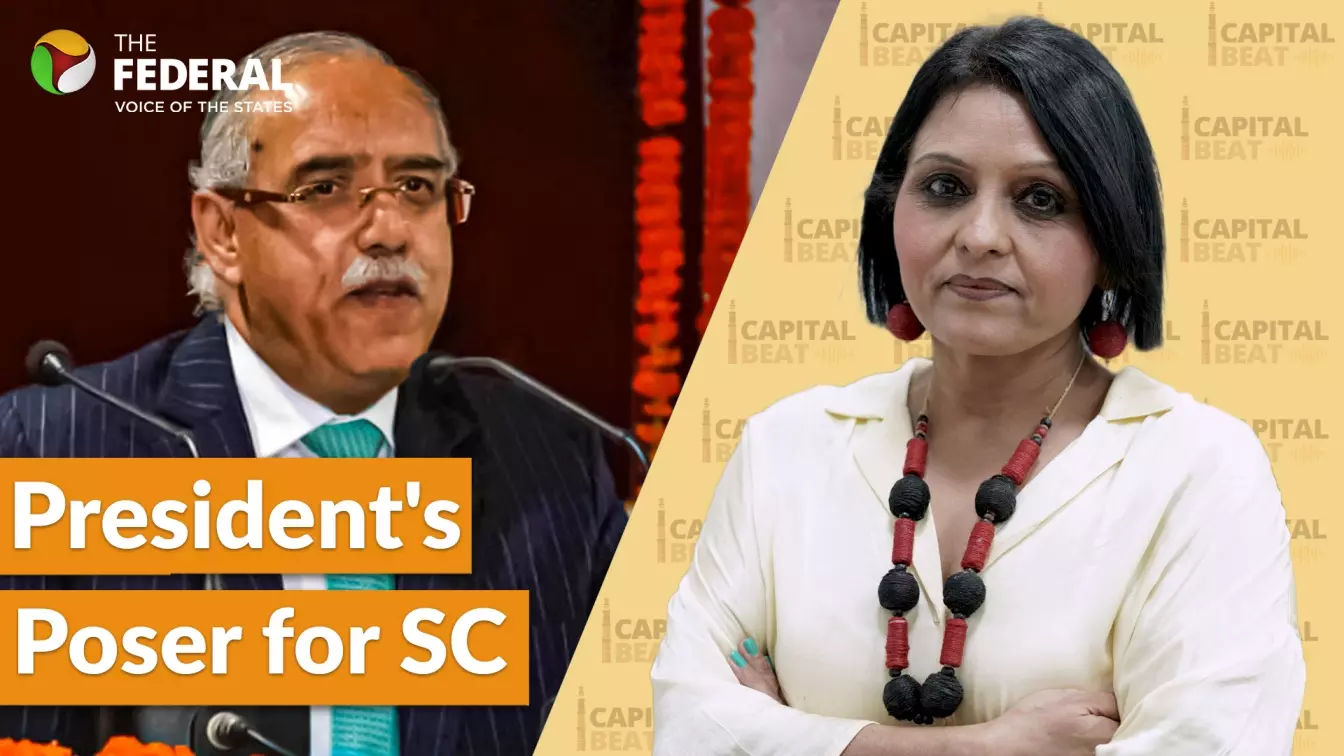
Justice Deepak Gupta interview
What to make of President's 14 questions? Interview with Justice Deepak Gupta
President Murmu asks Supreme Court to clarify powers of Governors over state Bills after TN verdict. Is this constitutional clarity or judicial overreach?

In the latest episode of Capital Beat, former Supreme Court judge Justice Deepak Gupta joined The Federal's Neelu Vyas to discuss President Droupadi Murmu's historic decision to invoke Article 143(1) and refer 14 constitutional questions to the Supreme Court. The questions centre on the roles and powers of Governors and the President concerning state legislation, particularly in light of the April 8 Supreme Court judgment setting timelines for gubernatorial action.
Neelu Vyas: Justice Gupta, do you see the President’s 14-question reference under Article 143 as a departure from tradition in constitutional jurisprudence?
Justice Deepak Gupta: Not at all. Article 143 gives the President the right to seek the Supreme Court’s advice. It's rarely used, but it’s entirely within the framework. This is not binding like a judgment — it’s advisory. In fact, I think it should have been invoked earlier.
Vyas: The timing of the reference, coinciding with Justice B R Gavai becoming the new Chief Justice, has raised eyebrows. Do you see it as a challenge for the new CJI?
Justice Gupta: Possibly. But more important is the context: the April 8 judgment on the Tamil Nadu Governor prescribed timelines. The government wasn’t happy. Some questions posed are easy to answer; others are complex.
Also read: Here are the 10 TN Bills now deemed approved after SC’s rap for Governor Ravi
Vyas: Let’s talk about Article 200. What are the Governor’s constitutional options when a Bill is passed by a state Assembly?
Justice Gupta: The Governor has three options: assent, withhold assent with reasons, or refer to the President, but only in very peculiar circumstances. The problem is that governors are now acting as political agents. That’s not how the Constitution envisioned the office.
Also read: President Murmu flags overreach, poses 14 queries to SC on Governors’ powers
Vyas: Is the Supreme Court justified in imposing timelines, or is this judicial overreach?
Justice Gupta: Courts are usually cautious about directing high constitutional authorities. But in this case, the delay was unreasonable. The question is whether the Court was right in fixing 90-day deadlines. That might be overreach. Maybe "as soon as possible" should vary case by case.
Also read: 'To paralyse non-BJP states': Stalin slams Centre for seeking SC opinion Guv deadlines
Vyas: Was it appropriate for the Court to issue directions to the President?
Justice Gupta: That’s debatable. The President wasn’t a party in that case. I wouldn't have gone into that. While the Court can critique gubernatorial delays, directing the President is a different matter. The Constitution does not mention timelines for the President.
Vyas: What about Article 142? Can constitutional powers of the President or Governor be substituted under it?
Justice Gupta: Article 142 allows the Court to do complete justice. It was used here because 10 Bills were wrongly sent to the President. Since the Governor failed to act, the Court deemed the Bills assented using Article 142. This is rare but legally justified.
Vyas: There's also a question on Article 131 — whether the Supreme Court can entertain disputes between states and the Centre outside its original suit jurisdiction.
Justice Gupta: With respect, that question is poorly framed. Article 131 is subject to other provisions. The Court has entertained writ petitions in Centre-state disputes. It’s already happening. This is not a new issue.
Vyas: Should the matter have gone to a Constitution Bench?
Justice Gupta: Probably, yes. Especially when directions are being issued to the President, it involves substantial interpretation of the Constitution. I believe the Attorney General even raised this.
Vyas: Why weren’t these articles argued in court earlier?
Justice Gupta: Hard to say. The government could have filed a review, but chose this route instead. It's not a malafide move. Some questions are significant and deserve clarity.
Vyas: Was this a smart move by the President and the government?
Justice Gupta: Absolutely. I was expecting it. This judgment raises further questions. Advisory opinion under Article 143 is a legitimate mechanism to get them answered.
Vyas: The Vice President had earlier questioned the judiciary's authority to "order" the President. Was he wrong?
Justice Gupta: With respect, yes. Courts aren’t powerless. They issue orders even to constitutional authorities. But I agree, giving fixed timelines to the President was a stretch.
Vyas: Can the courts now amend their judgment?
Justice Gupta: Only through a review, which would go to the same Bench. My suggestion: let the review wait until the advisory opinion comes. Judges are humble enough to correct course if necessary.
Vyas: Finally, is it trickier for the Court to fix this or for the government to explain itself?
Justice Gupta: It’s not tricky. Both sides will argue. The Court will decide. I still believe most of the April 8 judgment holds good, except maybe for the timelines.
Justice Gupta’s message was clear: governors must act like constitutional heads, not political agents. Timely governance and federal balance are crucial, but the courts, too, must tread carefully when directing constitutional authorities.
(The content above has been generated using a fine-tuned AI model. To ensure accuracy, quality, and editorial integrity, we employ a Human-In-The-Loop (HITL) process. While AI assists in creating the initial draft, our experienced editorial team carefully reviews, edits, and refines the content before publication. At The Federal, we combine the efficiency of AI with the expertise of human editors to deliver reliable and insightful journalism.)

